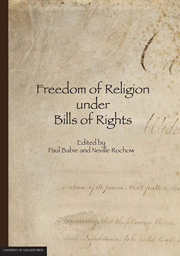Book contents
- Frontmatter
- Contents
- Acknowledgments
- List of Contributors
- Foreword by The Hon Sir Anthony Mason AC KBE: Human Rights and Courts
- INTRODUCTION
- SETTING THE SCENE
- CONTEMPORARY FREEDOM OF RELIGION ISSUES
- COMPARATIVE EXPERIENCE WITH FREEDOM OF RELIGION
- 9 Political Culture and Freedom of Conscience: A Case Study of Austria
- 10 The Sky is Falling if Judges Decide Religious Controversies! – Or is it? The German Experience of Religious Freedom Under a Bill of Rights
- 11 Religious Freedom in a Secular Society: The Case of the Islamic Headscarf in France
- 12 Religious Freedom in the UK after the Human Rights Act 1998
- 13 Judicial Interpretation, Neutrality and the US Bill of Rights
- 14 Protecting Religious Freedom: Two Counterintuitive Dialectics in US Free Exercise Jurisprudence
- 15 Walking the Tightrope: The Struggle of Canadian Courts to Define Freedom of Religion under the Canadian Charter of Rights and Freedoms
- 16 Quo Vadis The Free Exercise of Religion? The Diminishment of Student Religious Expression in US Public Schools
- 17 Freedom from Discrimination on the Basis of Religion
- 18 Ruminations from the Shaky Isles on Religious Freedom in the Bill of Rights Era
- 19 Indigenous Peoples and Bills of Rights
- TABLE OF LEGISLATION AND INTERNATIONAL INSTRUMENTS
- INDEX
12 - Religious Freedom in the UK after the Human Rights Act 1998
from COMPARATIVE EXPERIENCE WITH FREEDOM OF RELIGION
Published online by Cambridge University Press: 05 June 2013
- Frontmatter
- Contents
- Acknowledgments
- List of Contributors
- Foreword by The Hon Sir Anthony Mason AC KBE: Human Rights and Courts
- INTRODUCTION
- SETTING THE SCENE
- CONTEMPORARY FREEDOM OF RELIGION ISSUES
- COMPARATIVE EXPERIENCE WITH FREEDOM OF RELIGION
- 9 Political Culture and Freedom of Conscience: A Case Study of Austria
- 10 The Sky is Falling if Judges Decide Religious Controversies! – Or is it? The German Experience of Religious Freedom Under a Bill of Rights
- 11 Religious Freedom in a Secular Society: The Case of the Islamic Headscarf in France
- 12 Religious Freedom in the UK after the Human Rights Act 1998
- 13 Judicial Interpretation, Neutrality and the US Bill of Rights
- 14 Protecting Religious Freedom: Two Counterintuitive Dialectics in US Free Exercise Jurisprudence
- 15 Walking the Tightrope: The Struggle of Canadian Courts to Define Freedom of Religion under the Canadian Charter of Rights and Freedoms
- 16 Quo Vadis The Free Exercise of Religion? The Diminishment of Student Religious Expression in US Public Schools
- 17 Freedom from Discrimination on the Basis of Religion
- 18 Ruminations from the Shaky Isles on Religious Freedom in the Bill of Rights Era
- 19 Indigenous Peoples and Bills of Rights
- TABLE OF LEGISLATION AND INTERNATIONAL INSTRUMENTS
- INDEX
Summary
According to a book title chosen by one commentator on the UK's Human Rights Act 1998, Professor Francesca Klug, human rights are Values for a Godless Age. No doubt before the events of September 11 2001 the secularization thesis had a certain resonance. The legislation could be seen as a (very faint) shadow of that great hymn of the secular state — the French Declaration of the Rights of Man. Certainly some religious organisations feared that rather than the Human Rights Act 1998 enhancing their religious freedom it would be used against them and they therefore sought — unsuccessfully — guarantees against litigation in the form of exemptions. A decade later, the revolutionary fervour has cooled somewhat and an assessment can be made of the treatment of religious liberty under the Act to date. We now know also that the obituary notices for religious faith were premature, even in (comparatively) secular Western Europe: ‘God is Back’ as another recent book title has it. Indeed, the resurgence of a vigorous religious discourse in public life in the UK is perhaps not just a reaction to secularization but in a sense also evidence of a growing human rights culture following incorporation of the European Convention.
The focus in this chapter is on a handful of the more controversial religious liberty claims that have come before the courts since 2000. I have selected these for the range and variety or issues that they raise directly concerned with claims to manifest religious belief. These include whether Christian parents have a right that their children be educated in private schools in accordance with their religious beliefs on discipline; whether a Muslim schoolgirl has the right to wear a jilbab, contrary to the school uniform policy of her (mixed) state secondary school; whether a Hindu community can resist an order for the destruction of a diseased bullock of sacred religious significance to them; and whether orthodox Hindus should be accommodated in their wish for cremation upon an open-air funeral pyre.
- Type
- Chapter
- Information
- Freedom of Religion under Bills of Rights , pp. 239 - 252Publisher: The University of Adelaide PressPrint publication year: 2012

